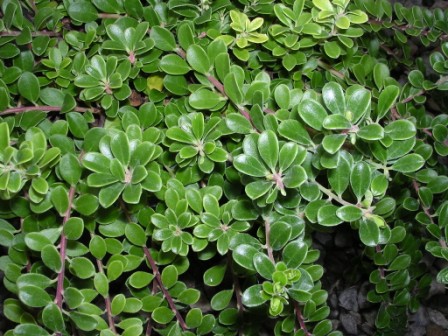Bearberry - Arctostaphylos uva-ursi

Common Names: Bearberry, Kinnikinnick, Pinemat Manzanita, Uva-ursi, Arctic Bearberry, Mealberry, Arctostaphylos uva-ursi, Costrounek, Medvedi Hrozen, Polarniček
Latin Name: Arctostaphylos uva-ursi
Origin: Asia, Europe, North America
Short Introduction
Bearberry is a hardy herb that thrives in both dry and moist soils and tolerates sun or partial shade. It can be propagated by seeds, cuttings, or division. However, wild bearberry is a protected species throughout Central Europe and should not be harvested from the wild.
Detailed Description
A remarkable natural urinary tract disinfectant and botanical antibiotic.
Botanical Information
Bearberry is a small, woody shrub, rarely exceeding 30 centimeters in height. It features evergreen, firm, small leaves, irregularly arranged on its shoots. The underside of each leaf is always lighter than the top. The flowers range in color from white to pale pink. The fruit is a bright red berry.
The plant has a smooth, upright stem growing from a single unbranched root. Its branches are regular, long, and sturdy.
Origin and Distribution
Bearberry is most commonly found in northern regions worldwide, typically at higher elevations rather than lowlands. The exact origin is uncertain, but its distribution spans a vast area from Northern Europe (Iceland, Norway) south to Spain, east through Turkey, Siberia, and into the Himalayas. In North America, its range stretches from Southern California through the Rocky Mountains and into the northeastern United States.
Usage / Dosage
Bearberry leaf extracts have shown positive antibiotic effects against several organisms, confirmed in both research and traditional use. Its diuretic properties have been traditionally valued to help lower high blood pressure and reduce the risk of developing cardiovascular diseases due to hypertension.
The antibiotic effect of arbutin, a major active compound in bearberry, has been demonstrated in clinical settings—especially against Staphylococcus aureus and Escherichia coli in urine. Both aqueous and ethanol extracts have shown antimicrobial activity against multiple bacteria, including Staphylococcus, Bacillus, Escherichia coli, Mycobacterium, Shigella, and Helicobacter pylori (a contributor to peptic ulcer disease).
Bearberry has also been studied for its anti-inflammatory properties, particularly for alleviating nonspecific inflammation symptoms and reducing swelling. Additional evidence suggests the plant's compounds modestly lower blood sugar and support the health and function of the kidneys and urinary system through various mechanisms.
In comparison with pharmaceutical medications, bearberry has shown a diuretic effect that is on par with certain medicinal diuretics. It is traditionally used for hematuria (blood in the urine), diabetes, and kidney-related conditions. Thanks to the presence of tannins, it also offers astringent effects that can benefit skin, mucous membranes, and diarrhea. Bearberry is recommended to help with gout by facilitating the excretion of uric acid, and is useful for assisting with urinary stones and their elimination from the urinary tract.
Active Compounds
The primary active ingredients in bearberry are phenolic glycosides, particularly arbutin and methylarbutin. The concentration of these compounds determines the quality of the plant material. Bearberry also contains tannins with mild therapeutic effects, as well as smaller amounts of essential oils, flavonoids, and organic acids.
Traditional Dosage
Therapeutically, the leaf of bearberry is used, whether whole or fragmented, fresh or dried. Dried extract is dissolved in either 60% alcohol (3-5:1) or in water (2-5:1).
Bearberry herbal tea can be made from 1.5–4.0 grams of the herb (in any form), infused in approximately 150 ml of water and steeped for 15 minutes before straining. A cold macerate is prepared by soaking the same amount of herb in 150 ml of lukewarm water for around 30 minutes. The resulting extract should be used immediately, and regular intake for up to 2 weeks is recommended for full benefits.
To preserve and fully extract the active compounds, steep 3 teaspoons of leaf in about 600 ml of lukewarm water and let it macerate in the shade for at least eight hours. Strain and drink.
Bearberry is not recommended for pregnant or breastfeeding women.
